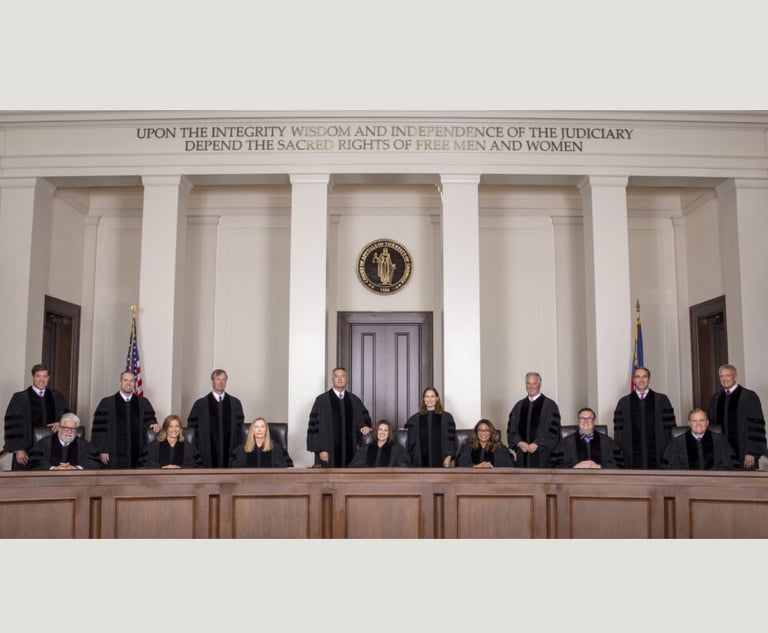 Then-FBI director Robert Mueller during a hearing on FBI oversight by the Senate Judiciary Committee. Dec. 6, 2006.(Photo: Diego M. Radzinschi/ALM)
Then-FBI director Robert Mueller during a hearing on FBI oversight by the Senate Judiciary Committee. Dec. 6, 2006.(Photo: Diego M. Radzinschi/ALM)Here's the 448-Page Mueller Report (Sally Yates Is on Page 243)
The U.S. Justice Department on Thursday released Mueller's findings on Russia's interference in the 2016 presidential campaign.
April 18, 2019 at 11:26 AM
4 minute read
The original version of this story was published on National Law Journal
U.S. Attorney General William Barr on Thursday released a redacted version of Robert Mueller's 448-page report on Russian interference in the 2016 presidential election.
An initial scan of the report showed the only member of Georgia's legal community mentioned is Sally Yates, who was acting attorney general in the first 10 days of President Donald Trump's administration. Now at King & Spalding, Yates appears on page 243 of the entire document (page 31 of Volume II). That part concerns her alerting White House Counsel Don McGahn of connections between Russians and then-National Security Advisor Michael Flynn. (A list of individuals named in the report appears on page 401, or Appendix B.)
Yates was fired by Trump on Jan. 30, 2017, for refusing to defend the first version of the administration's ban on travel to the U.S. by citizens of a host of majority Muslim countries. She could not be reached immediately Thursday.
Barr separately sent a letter to Congress on Thursday.
Mueller had earlier concluded there was insufficient evidence showing Trump campaign officials conspired with Russian actors to meddle in the election. Mueller, who led a team of more than a dozen prosecutors, declined to take a position on whether Trump obstructed investigators.
Barr spoke at a press conference Thursday morning in Washington. Read his full remarks here.
Two lawsuits in Washington's federal trial court are expected to challenge the scope of redactions in the report, and Barr is likely to testify in Congress next month about his summary of Mueller's report. U.S. House Democratic leaders have told the Justice Department they want full access to the report, and they could move to subpoena it.
During a U.S. House Appropriations subcommittee budget hearing last week, Barr said the Justice Department would color-code redacted portions of the report and provide explanatory notes that describe the basis for each redaction. The four types of information that would be redacted included grand jury information, and material that could interfere with ongoing prosecutions or compromise sources and methods.
Barr on Thursday said the president's lawyers were not allowed to make, nor did they request any redactions.
“These redactions were applied by Department of Justice attorneys working closely together with attorneys from the Special Counsel's Office, as well as with the intelligence community, and prosecutors who are handling ongoing cases. The redactions are their work product,” Barr said Thursday.
The U.S. Justice Department said late Wednesday in a court filing that some members of Congress would get access to a copy of the Mueller report “without certain redactions.”
“The Justice Department intends to secure this version of the report in an appropriate setting that will be accessible to a limited number of members of Congress and their staff,” assistant U.S. attorneys Jonathan Kravis and Michael Marando said in the filing.
The release of Mueller's report culminates a more than two-year investigation by Mueller and his team. Mueller, who left Wilmer Cutler Pickering Hale and Dorr after he was named special counsel, has not announced his next steps. His team included several Wilmer partners, whose next moves also have not been announced.
Several open investigations or pending criminal cases have been routed to federal prosecutors in Washington and New York.
Read the Mueller report here—part 1:
And here:
Jonathan Ringel of the Daily Report contributed information about Sally Yates to this article, which first ran in the National Law Journal.
Read more:
This content has been archived. It is available through our partners, LexisNexis® and Bloomberg Law.
To view this content, please continue to their sites.
Not a Lexis Subscriber?
Subscribe Now
Not a Bloomberg Law Subscriber?
Subscribe Now
NOT FOR REPRINT
© 2025 ALM Global, LLC, All Rights Reserved. Request academic re-use from www.copyright.com. All other uses, submit a request to [email protected]. For more information visit Asset & Logo Licensing.
You Might Like
View All
Experts Not Foreseeing More Rules Governing Prosecutors' Actions After Georgia Court's Removal of DA From Election Case
8 minute read

Appeals Court Removes Fulton DA From Georgia Election Case Against Trump, Others
6 minute read
Fulton Judge Rejects Attempt by Trump Campaign Lawyer to Invalidate Guilty Plea in Georgia Election Case
3 minute readTrending Stories
- 1How We Won: BraunHagey’s $56M Trademark Win Over Molson Coors Upheld by 9th Circuit
- 2DLA Piper NY Office Adds Ex-Verizon GC As Big Law Goes on In-House Hiring Spree
- 3ExxonMobil Sues California AG Bonta, Environmental Groups for Advanced Recycling 'Smear Campaign'
- 4'I've Had a Lot of Fun With Opinions': A Look Back at 10 Quintessential Opening Lines From Vice Chancellor Glasscock
- 5US Attorney Phillip Talbert Announces Resignation
Who Got The Work
Michael G. Bongiorno, Andrew Scott Dulberg and Elizabeth E. Driscoll from Wilmer Cutler Pickering Hale and Dorr have stepped in to represent Symbotic Inc., an A.I.-enabled technology platform that focuses on increasing supply chain efficiency, and other defendants in a pending shareholder derivative lawsuit. The case, filed Oct. 2 in Massachusetts District Court by the Brown Law Firm on behalf of Stephen Austen, accuses certain officers and directors of misleading investors in regard to Symbotic's potential for margin growth by failing to disclose that the company was not equipped to timely deploy its systems or manage expenses through project delays. The case, assigned to U.S. District Judge Nathaniel M. Gorton, is 1:24-cv-12522, Austen v. Cohen et al.
Who Got The Work
Edmund Polubinski and Marie Killmond of Davis Polk & Wardwell have entered appearances for data platform software development company MongoDB and other defendants in a pending shareholder derivative lawsuit. The action, filed Oct. 7 in New York Southern District Court by the Brown Law Firm, accuses the company's directors and/or officers of falsely expressing confidence in the company’s restructuring of its sales incentive plan and downplaying the severity of decreases in its upfront commitments. The case is 1:24-cv-07594, Roy v. Ittycheria et al.
Who Got The Work
Amy O. Bruchs and Kurt F. Ellison of Michael Best & Friedrich have entered appearances for Epic Systems Corp. in a pending employment discrimination lawsuit. The suit was filed Sept. 7 in Wisconsin Western District Court by Levine Eisberner LLC and Siri & Glimstad on behalf of a project manager who claims that he was wrongfully terminated after applying for a religious exemption to the defendant's COVID-19 vaccine mandate. The case, assigned to U.S. Magistrate Judge Anita Marie Boor, is 3:24-cv-00630, Secker, Nathan v. Epic Systems Corporation.
Who Got The Work
David X. Sullivan, Thomas J. Finn and Gregory A. Hall from McCarter & English have entered appearances for Sunrun Installation Services in a pending civil rights lawsuit. The complaint was filed Sept. 4 in Connecticut District Court by attorney Robert M. Berke on behalf of former employee George Edward Steins, who was arrested and charged with employing an unregistered home improvement salesperson. The complaint alleges that had Sunrun informed the Connecticut Department of Consumer Protection that the plaintiff's employment had ended in 2017 and that he no longer held Sunrun's home improvement contractor license, he would not have been hit with charges, which were dismissed in May 2024. The case, assigned to U.S. District Judge Jeffrey A. Meyer, is 3:24-cv-01423, Steins v. Sunrun, Inc. et al.
Who Got The Work
Greenberg Traurig shareholder Joshua L. Raskin has entered an appearance for boohoo.com UK Ltd. in a pending patent infringement lawsuit. The suit, filed Sept. 3 in Texas Eastern District Court by Rozier Hardt McDonough on behalf of Alto Dynamics, asserts five patents related to an online shopping platform. The case, assigned to U.S. District Judge Rodney Gilstrap, is 2:24-cv-00719, Alto Dynamics, LLC v. boohoo.com UK Limited.
Featured Firms
Law Offices of Gary Martin Hays & Associates, P.C.
(470) 294-1674
Law Offices of Mark E. Salomone
(857) 444-6468
Smith & Hassler
(713) 739-1250






